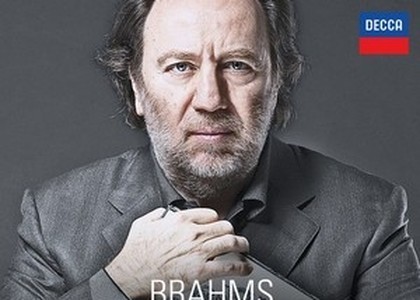> Vote for the best classical album of 2015

Riccardo Chailly is Conducting Brahms - Arpeggio, 6th February
If you would like to vote for this cd please vote HERE
2nd February, 2015, is a day rich in discographic releases. Decca Classics offers us a new album, containing Johannes Brahms' works, under the conducting baton of a classical-music colossus - Riccardo Chailly, who has officially been at the head of theLeipzig Gewandhaus Orchestra for the past ten years.
">It is difficult to comprise, in just a few words, the scope of this conductor's career, who, as he himself declared in an interview, made his debut at the age of fourteen, alongside the I Solisti Veneti ensemble, and, since then, there has been no season during which he did not not conduct an orchestra … He tied his name to that of a great institution - the Teatro Comunale di Bologna, after he made his debut at the Teatro alla Scala in Milan, in 1978. He conducted the Berlin Radio Symphony Orchestra, the London Symphony Orchestra and then, after sixteen years, the Royal Concertgebouw Orchestra in Amsterdam; but, in the 80's, Herbert von Karajan introduced him to the Leipzig Gewandhaus Orchestra. They met sporadically until 2001, when Chailly was named the nineteenth Kapellmeister in this ensemble's history and he became the principal conductor of the orchestra in 2005.
We have reached the topic of this album's coordinates - the two serenades by Johannes Brahms, which were recorded with Riccardo Chailly standing at the conducting desk of the Leipzig Gewandhaus Orchestra. This album is released after the release of another album last year, which contained the complete series of Brahms' symphonies and which was a resounding success for both the orchestra and its conductor, the best album of 2014, according to Gramophone magazine's ranking. We are mentioning all these details because we are confronting with the same successful formula, with the same manner of looking at the German composer's work, and yet getting off the beaten track.
The serenades preceded the symphonies, which represent the territory on which Brahms practised his ability to work with the material intended for large orchestras, which does not mean that we are listening to a music which lacks value. On the contrary; it is said that on the first evening, the Vienna Philharmonic Orchestra almost crashed while trying to interpret the Serenade No.2, by Brahms, because the members of the orchestra found it impossible to interpret due to its technical difficulties. This inedited Serenade No. 2 in A Major, Op. 16, by Brahms, which lacks the violin section, focuses on the woodwinds' section (the Gewandhaus version is fantastic) and is seconded by the low-pitched strings.
As for the conducting vision - it enters under a star of elegance, excellence, but also of rediscovering the senses, too, which has been neglected, or almost entirely forgotten. As a matter of fact, the Italian conductor believes that "the entire universe of music must aspire to change into a new musical style." And the reviewers hurry to remark that "for an orchestra which is so well anchored in the Austro-German tradition as is the Gewandhaus Orchestra, interpreting Brahms is part of its reason for existence; but Chailly brings in a different perspective - as in Beethoven, Mendelssohn and Mahler's cases, his approach is both careful to tradition and critique in the most constructive way possible. His Brahms is neither massive, nor sculpted with self-consciousness, and yet coherent." (The Guardian)
We continue to admire the Gewandhaus Orchestra, conducted by Riccardo Chailly, for its display of force in the woodwind register, the elegance of the discourse, which has nostalgic accents, in a dramatic interpretation. In fact, we are inspired by this recording, which has a specific elegance, which is specific to the old masters. The musical gesture is alive, nonchalant and it floats between remarks full of spirit and refinement at the construction level.
We recommend you this interpretation of this studied album, containing Brahms' works for the year 2015, belonging to Riccardo Chailly, an Italian maestro, who declares himself passionate about the Late-Romantic music and the modern repertoire. I don't believe in the ghosts' of the past, only in the great lessons it taught us, declared the conductor, who has been a Decca artist for more than thirty years. We were given a Brahmsian lesson through this recording, which is released after the complete series of some major composer's symphonies - Beethoven, Mahler, Bruckner and Brahms; they all comprise an implicit experience.
The album is included in the Vote for the Best Classical Album of 2015 Radio Romania Music campaign.
Translated by Izabela - Elvira Vațe and Elena - Daniela Radu
MTTLC, The University of Bucharest














